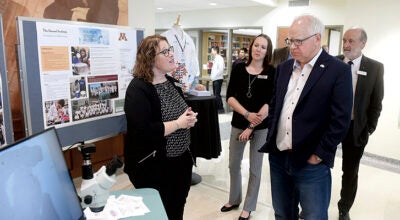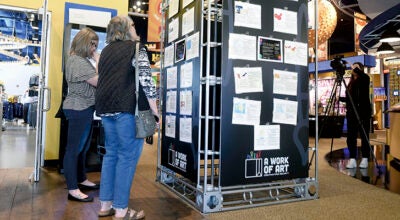Mechanic shortage expected at Hormel
Published 2:16 pm Saturday, October 18, 2008
Editor’s note: This is the first in a three-part series on Riverland Community College.
As the baby boomers near retirement, Riverland Community College and companies like Hormel Foods Corp. are seeing a shortage of maintenance mechanics that could grow and also could hurt local businesses.
Recently Hormel Foods did a statewide demographic analysis of its maintenance department to look at how many of these employees were 55 years old or older and had at least 25 years of experience. Such employees can retire after 30 years with a full pension.
The belief is that as many of the baby boomers near retirement age, the retirement of these employees could leave large gaps in companies as soon as five years.
Tim Fritz, director of industrial relations at Hormel in Austin, said he doesn’t think the situation at Hormel is unique.
“I hope it has no effect. I hope we’re able to meet the demand,” Fritz said. “And I’m certain we will. But where we source a lot of those mechanics is out of our community colleges. That’s why we wanted (Riverland) to be a partner in this process and that they were aware of what we saw as a growing demand.”
Tim Fritz traveled to a Hormel plant in Fremont, Neb., over the summer, where a similar study showed 49 percent of the maintenance employees fell into this group. This led Fritz to perform the analysis in plants like Austin.
“We looked at the Austin plant, 25 percent of our present maintenance workforce was within that demographic,” Fritz said. “Obviously we’ve got a lot of potential retirements. Obviously, people can work as long as they want to work. They can work well past 60 years old. But the thought being, that’s a large percentage of our workforce that could leave in the next five years.”
With 25 percent accounting for about 35 employees, Fritz shared this information with people at Riverland to see if other employees were experiencing the same problem and so Riverland could attract students to meet the future demand.
According to Gary Peterson, an instructor in the industrial maintenance and mechanics program, there are currently about 40 students in the program at Riverland.
“The maintenance field is kind of a sleeper field. People don’t know a lot about it,” Peterson said. “There are a lot of jobs. They’re actually very good pay, very good benefits. Good challenges for work. You never know what you’re going to do from day to day, because you’re moving throughout a plant, a facility to be working on different projects.”
The field may be a sleeper because of public perception. Peterson said people know what auto-mechanics do because people take their cars to them. While maintenance mechanics hold similar jobs, not a lot of people know about them because they’re working within different facilities.
Peterson said Riverland students have a number of different options after getting their degrees. They can work in mechanical maintenance to keep equipment running, to keep equipment from breaking down and to do other machine repairs. Other avenues include the boiler field, welding and windmill maintenance, which is a new field.
According to Peterson, after completing the two-year program, students graduate to three to four jobs they can choose between.
Peterson said that Riverland plans to recruit students in high schools to spread knowledge of the program through things like a welding competition.
“If we can’t get more interested in two-year college educations and jobs that require a specialized skill like industrial maintenance mechanics or carpentry and electricians, we’re going be in a deep world of hurt in about five years when all these people retire and we can’t produce goods we need to produce. We can’t do the services we need to do, because we don’t have anybody in these career areas,” Dean of Career and Technical Education Steve Bowron said.
According to Bowron, Innovance, a part of Lou-Rich Contract Engineering & Manufacturing, donated $25,000 to go toward scholarships for industrial maintenance mechanics and welders.
Peterson said companies will play a big role in attracting employees.
“I think the companies are going to have to step up,” Peterson said. “And some of the companies are presently doing that. One of the ways that companies can help is to help pay tuition for students.”
Currently, McNeilus Truck & Manufacturing, Viracon Inc. and Hormel are companies doing this, Peterson said.
But this dependence on companies does not stop there. According to Peterson, companies are looking at current employees to find someone they could send to school to fit this need.
“I think some of the bigger companies know what’s happening, and are talking about it,” Peterson said. “I think we’ll start to do more in-house training for companies. They will train their present employees to fit the need.”
Fritz said Hormel has told employees that if they want to pursue a job in the maintenance division, the company would pay for the classes.
“We’ve established a training curriculum — an apprenticeship program if you will.” Fritz said.
“We’ve kind of cherry-picked the courses that we think are most important to our workplace. We’ve taken those to our production employees and said if you take these courses and do some on the job training, you can get into maintenance.”
“We’ve provided a roadmap for our production employees to make that transition to a better and a higher paying job,” Fritz said.
One problem in training current employees is finding time and a location for people from different cities to meet. Peterson said a possible solution to this is to bring the schooling to the students.
“The problem becomes getting those students in the facility,” Peterson said. “If we can bring the facility to them and make it more mobile, I think it will be more effective. I think because companies are going to be so short in the future with skilled labor, we’re going to have to do whatever it takes to do that. I think this is an avenue companies want, because (employees) can do it for a couple of hours a day. They can pull the people off of the floor and bring them in there.”
Peterson said Riverland is currently looking to find new ways to educate a company’s current employees. Riverland is currently looking into purchasing $50,000 worth of equipment to teach maintenance mechanics to use new technologies for inferred imaging, laser alignments and vibration analysis.
Since these cameras can cost more than $10,000, Riverland could purchase this equipment and train a company’s employees.
“In our case, if we purchase the equipment, and we go to the school and we learn how to operate this equipment, we then will be using it to train our students,” Peterson said. “We can also go into places such as Hormel or Viracon, and we can put on seminars in house because we are trainers and we will be trained to do that.”
However, educating current employees may not be enough to supply the employees to fit the need in the maintenance mechanics field. To fit the need, Peterson said Riverland may need to expand their program, which could mean doubling the number of students and increasing the number of instructors.
“To make sure that we have ample employees available to these companies and see the expansion of the programs, that’s going to be a big challenge,” Peterson said. “We’re going to have to expand the program, expand it with instructors. Primarily grow the program.”
According to Peterson, this will become a more crucial problem as time goes on, and if the problem is not met, the effects could be seen as soon as five years.
“We don’t like to look down that road,” Peterson said of what the future may look like if this need is not met. “The future impact is going to be more costly to companies. Profits are going to be diminishing. You’re going to have breakdowns. We may find that if we can’t fill that niche here. Companies may back off on the expansion or growth. Or they may end up relocating to a place where they can find these employees.”





